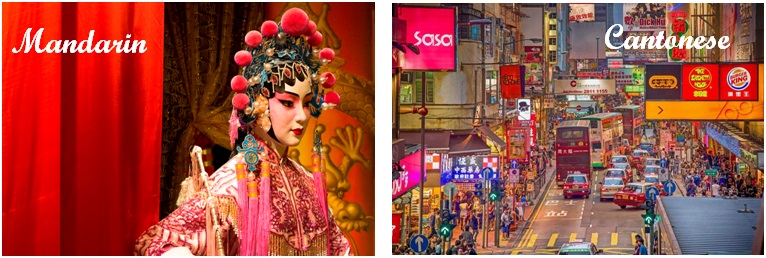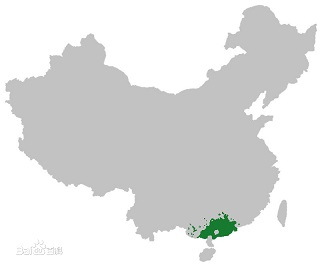Mandarin vs. Cantonese
A Quick Comparison Between The Two Most Spoken Chinese Varieties
|
1 |
If you need to get your documents translated into Chinese, or wish to learn this language, or just interested in knowing a little bit more about its linguistic facts, you might already be aware of (or confused by) its two major versions: Mandarin & Cantonese. What are the DIFFERENCES between the Cantonese and Mandarin? WHERE are they spoken? Which one of them should I learn or translate to ...? Let's dive a little bit deeper below:
CHINESE MANDARIN
It's the most spoken "dialect" and the lingua franca between people from different dialect areas in China. On February 6, 1956, the State Department of PRC had published the Directives on Promotion of Standard Mandarin in which it was officially established that: The Chinese Mandarin takes the pronunciations of Beijing voice as its standard reference and northern Chinese speech as its dialectal basis, and use the classical modern vernacular Chinese books for grammar norms.
The establishment of Mandarin as the "national standard language" and the nationwide promotion of it was NOT in order to eliminate the use of local dialects, but only to remove the barriers caused by differences of the dialects and facilitate smoother communication between different dialectal communities. After decades of efforts, it turns out that this job had been done quite well. As long as you speak Mandarin, you can virtually talk to anyone in this country. An interest story about the English word "Mandarin" is that it's said to stem from the phrase "Man-Da-Ren", the Chinese addressing for the Manchus Officials back in Qing Dynasty a century ago. Is this true? No one really knows - at least the Chinese people don't know. In China, we call this standard spoken dialect as "Pu-Tong-Hua", which literally means "common language". Most of us here are not aware that our Pu-Tong-Hua has got a very unique English name as "Mandarin". |
1 |
CHINESE CANTONESE
As one of the 7 major dialects spoken in China, Cantonese is considered as the one with the 2nd largest speaking population only after the Pu-Tong-Hua (Mandarin). During a super turmoil and chaotic century of "Five Dynasties and Ten Kingdoms" era (907-979 A.D.) in China's history, various groups of ancient Han people migrated from the central area to the Ling-Nan region to evade from the endless wars back home. Speaking ancient Central Chinese language ("Xia" dialect, not today's Mandarin), these Han immigrants mingled with the local Bai-Yue inhabitants, so did their words, accents and speeches over the long time of integration. Cantonese, or Yue-Yu, came out into being from this process. Nowadays, Cantonese is spoken in China's Guangdong & Guangxi Province. It's also the official and dominant spoken voice in Hong Kong and Macau. Moreover, if you've visited an overseas Chinatown, the chances are that what you heard from the local residents are more likely to be Cantonese than Mandarin - the reason is that the Chinese descendents living in Chinatown are mostly from families with their origins in Guangdong Province, who immigrated from their homeland to where they are now about hundred years ago, but still maintained a lot of old traditions, including the language they speak.
So how does the word "Cantonese" come from? I heard the Chinese people call it "Yue" anyway... Well, this was because it's the dominant spoken voice of Guangdong Province, which was referred to as "Canton" back in the history. Where is the Cantonese mainly spoken? Check this map:
The Map for the Cantonese Speaking Area in Mainland China
|
1 |

Generally Speaking, How Different are the Mandarin & Cantonese?
In Written Form: Similar (Could even be the same in some cases)If it's in written form, Cantonese and Mandarin could be very similar or even totally mutual intelligible, except for that Simplified Chinese characters are used in the Cantonese speaking regions in Mainland China while the Traditional Chinese characters are used in Hong Kong.
In Spoken Form: Totally DifferentThe spoken forms of Mandarin and Cantonese, however, are quite different. Although Cantonese shares some vocabulary with Mandarin, the two varieties are mutually unintelligible, when spoken, because of differences in pronunciation, grammar and lexicon. They sound totally different. As Cantonese speakers may commonly put it, it’s like “the chicken talking to the duck.” Cantonese speakers and Mandarin speakers cannot understand each other without significant and adequate amount of pre-exposure.
Cantonese vs. Mandarin, Are They Different Dialects or Different Languages?
Since they are so different, has been heated debate whether or not they should be considered separate languages rather than simply two dialects of an umbrella Chinese language. While they are both tonal languages (where different tones give different meanings to the same sound), the number of tones is different. Mandarin has only four tones per sound, while Cantonese has at least six (and can have up to nine). Mandarin and Cantonese even have different vowels and consonants. Can they be considered two different languages?
No we don't think so. "Language" might be a word that is too "big". The "Chinese" is surely a language, while either "Mandarin" or "Cantonese" should be dialects. Yet we've heard too many debates over the status of Cantonese, and the "dialect" might be a term of some sort of "degradation" to the ears of certain Cantonese speaking communities. Putting the political points aside, we believe "language varieties (or variants)" would just be perfect for both the Mandarin and Cantonese. It's technically precise / accurate, and everyone will just be happy (hopefully).
Simplified vs. Traditional Chinese - How Are They Related to Cantonese vs Mandarin?
Keep this basic information in mind: Mandarin and Cantonese are just two major different varieties (or dialects) of spoken Chinese, NOT forms of written scripts; while the Simplified Chinese and Traditional Chinese are the forms of the written scripts, not spoken dialects.
Can we say that Mandarin speakers use Simplified Chinese and Cantonese speakers use Traditional Chinese? That’s a major misconception. There is not certain answer to this question. People from the Province of Guangdong use Cantonese but write Simplified. Those from Taiwan speak Mandarin but write in Traditional Chinese. Traditional Chinese is used in both Hong Kong and Taiwan (Read about the Differences between the CHT language in Hong Kong and Taiwan), but the former speaks Cantonese while the latter speaks Mandarin. The only thing you can be sure of is that people from Mainland China use Simplified Chinese characters. If you can't decide which variety you need your documents translated into, why don't just write to us and professional translators at ACE CHINESE TRANSLATION will help identify the correct varieties for you.
[Extended reading about the Simplified Chinese vs. Tradtional Chinese]
Cantonese or Mandarin, which language variety should I learn?
With the continuous increasing of number of Chinese people living in the U.S., Canada, and other countries around the globe, and with the rise of China as an economic and cultural powerhouse on the world stage, learning Chinese has become more and more appealing to many second-language learners. And one of the most important questions that new potential Chinese learners would usually ask themselves is: Should I learn Cantonese or Mandarin?
The answer should ultimately depend on what you hope to accomplish by learning the language. Give some careful thought to your reasons for learning either Mandarin or Cantonese before you make your decision. A short answer, if you want to be able to communicate with the maximum number of Chinese speakers around the world, would be that you should learn Mandarin! Of course we should discuss further if a short answer is not what you are looking for.
If you're interested in working in most other parts of China, Mandarin will serve you better. This may explain why most students of Chinese language opt for Mandarin, as it opens up more opportunities. Yes, If your goal is to be widely understood, you should learn Mandarin because Mandarin can be understood even in Hong Kong, Macau and Canton (the main regions where the majority of people still speak Cantonese), and more and more Cantonese speakers are learning Mandarin nowadays.
If you've been offered a job in Hong Kong, Macau, or Guangzhou, Cantonese will serve you best. The same is true if you like movies from Hong Kong, as much of the meaning is lost in translation to English or even Mandarin. If you really want to be able to connect with people from Hong Kong, Macau, and Canton, you can still consider learning Cantonese.
What language should I choose for translation?
The answer is very similar to the above one: which language variety should I learn - it depends on where your target audience is.
If you want to reach to the maximum number of Chinese readers around the world, I suggest you to translate your materials into Mandarin. Mandarin is widely understood even in Hong Kong, Macau and Canton (the main regions where the majority of people still speak Cantonese), and more and more Cantonese speakers are learning Mandarin nowadays. If you really want your materials look local to better connect with people from Hong Kong, Macau, and Canton, you can still consider translating your documents into Cantonese.
The above information may sound a little complicated to non-Chinese speaking people. To make things simple, let’s put it this way:
中文翻译 中文翻譯 |
REGION / AREA | TRANSLATION CHOICE |
| Mainland China | Simplified Chinese, in Mandarin style | |
| Taiwan | Traditional Chinese, in Mandarin style | |
| Hong Kong | Traditional Chinese, In Cantonese style | |
| Macau | Traditional Chinese, in Cantonese style | |
| Singapore | Simplified Chinese, in Mandarin style | |
| Malaysia | Simplified Chinese, in Mandarin style | |
| Overseas Chinese Communities | It depends... |
Need to translate your language into Mandarin or Cantonese ? Tell us where are your target readers, then leave the other things to us! We are your dependable native speaking Mandarin Translators and Cantonese Translators.



